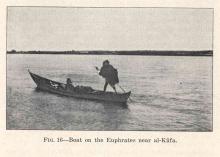By Kathryn Medill
Since 2006, the MELC Department has helped to host the Svoboda Diaries project (Svoboda Diaries Project – Svoboda Diaries Project), an effort to transcribe, annotate and publish the diaries of Joseph and Alexander R. Svoboda, who lived near Baghdad in the late nineteenth and early twentieth centuries. English versions of Joseph Svoboda’s 1897-1899 diaries and Alexander Svoboda’s Travel Journal are already available on the Svoboda Diaries’ website, with about ten more of Joseph’s diaries in production. Unprocessed images of some of the diaries can also be found through the UW Libraries.
The Svoboda Diaries give us a unique look at the connected experiences of the people who lived and traveled in the Ottoman Empire between 1862 and 1908. As the purser of a Euphrates and Tigris Steam Navigation Company steamship, Joseph Svoboda met all kinds of people and witnessed many sociohistorical developments.
His diaries record everything from the weather, to the ships’ passengers and cargo, to his own life experiences. For example, on one day in November 1897, while at his home base in Baghdad, Joseph visited French and English consular officials.
16 November 1897
Light NW breeze & very cold weather – at 8 ½ am. I came on board; the river is rising a little. The cold is awful all my hands are sore & chapped. I went home & at 2 pm I called on Alice where Henry was breakfasting. I took him & went to call on Colonel Lock the new English Consul General whom I had not seen yet, as he had arrived here two or three days before we started for Europe in April; he is a nice person & inquired from us about the Archaeological researches & excavations in this part of the country, as he wishes to have a digging in some parts. I recommended him to try Aboo Habba the ancient Zippara [i.e., Sippar]. We then called on the new French Vice Consul Monsr. Roné & Mons Jacquerés the Engineer in the Turkish Service…
The current head of the project, Dr. Annie T. Chen of the Biomedical Informatics program at UW, works together with Dr. Camille Cole, a late Ottoman historian at Illinois State University, to study the diaries. Drs. Chen and Cole, as well as many students at UW, have researched aspects of the diaries such as the Svobodas’ social networks; everyday life; mail; and quarantine, plague, and medicine. Read about their research here: Project Bibliography – Svoboda Diaries Project
The project recently released an interactive digital map of Joseph Svoboda’s journeys on the Tigris River from Basra in the south to Baghdad in the north (SDP Rivermap). The map includes information about the sites where Svoboda’s steamship loaded and unloaded cargo, giving fascinating insights into trade and production in the region.
For example, for the town of Aziziyah we read,
Aziziyah was a small village located about halfway between Baghdad and Kut al-Amara. According to the British Gazetteer of the Persian Gulf, prior to 1860 the site housed only a police station, but it grew into a small village after the Privy Purse administration (seniye), which managed the sultan’s private property, purchased property nearby. The village, which fluctuated between about 1000 and 200 people because of shifts in the Tigris and its changing administrative status, was not a major site of trade. In addition to servicing the local licorice monopoly, Joseph Svoboda’s diaries show that steamships only occasionally stopped at Aziziyah to load wool or unload mail, coal, and other cargo.
Those interested can click through and see that the steamship loaded on dates, sesame, wheat, wool, and coal at Aziziyah on a few occasions, while they unloaded vegetables, coal, sacks, packages, mail, telegrams… and on one trip, two deceased persons. Find a recent update about the Rivermap here: Envisioning the Landscape of the Svoboda Diaries | Middle Eastern Languages and Cultures | University of Washington
There are many ways that students interested in history, sociology, linguistics, digital humanities, or textual studies can get involved in the project! In Dr. Chen’s lab, transcription is currently handled by MELC alum Brianna Voss, while undergraduate students work on sociohistorical research, web development, and natural language processing. Watch for open lab positions in the Research Opportunities Database: Research Opportunities Database – Office of Undergraduate Research
***
My thanks to Dr. Annie T. Chen for kindly acting as a resource for this article.
